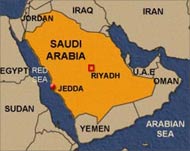Gulf Arabs dispute US abuse claims
Officials and rights activists in Gulf Arab states have disputed US charges that they are doing little to combat human-trafficking or end the use of children as camel jockeys.

Saudi Arabia and three other American Gulf allies – Kuwait, Qatar and the United Arab Emirates (UAE) – were added to the US blacklist for human trafficking in the State Department’s fifth annual Trafficking in Persons Report released on Friday.
“I am surprised that the report claims the Saudi government is not combating abuses or punishing those involved in violations, which in no way can be described as human-trafficking,” said Saleh al-Khathlan, a member of the officially sanctioned Saudi Arabian National Human Rights Association, on Saturday.
“There are cases of misuse of work permits by agents who bring foreign workers into the country, direct them to jobs other than those specified in their permits and take a commission from them, but these people are punished [when caught].”
There are about six million expatriates, mostly Asians, in Saudi Arabia.
“With regard to the smuggling of children from Yemen who are turned into beggars, authorities carry out campaigns to arrest those responsible and repatriate the children,” al-Khathlan said.
Modern slaves
As she released the State Department report on Friday, Secretary of State Condoleezza Rice said: “Trafficking in human beings is nothing less than a modern form of slavery.”
 |
|
Condoleezza Rice said trafficking |
John Miller, Rice’s senior adviser on human-trafficking, singled out Saudi Arabia for criticism.
“We have domestic workers being brought in from many countries into domestic servitude, child beggars, a lot of beatings, reports of beatings and rape,” he said.
The report said that of the 600,000 to 800,000 people trafficked across international borders on a global scale each year, about 80% are women and girls and up to 50% are children.
The majority of victims are trafficked into commercial sexual exploitation, it added.
But on Saturday the Saudi daily al-Watan front-paged a report on raids launched by security authorities to track down gangs involved in smuggling impoverished women and children across the southern border of Yemen.
It quoted the police chief of the southern Jazan region, Ahmad al-Qazzaz, as saying many of the dens used by beggars and the gangs which exploit them were raided in a 25-day campaign.
Camel jockeys
Officials in Saudi Arabia, Qatar and the UAE were either unreachable or unwilling to immediately comment on the US report, but in Kuwait a senior official said his country had adopted stiff measures to clamp down on human-trafficking.
These included closing the camel race club for four months in punishment for using child jockeys.
 |
|
The Gulf economies are heavily |
The government reopened it only after the club pledged not to violate the law banning the use of jockeys under 18 or weighing less than 45kg, said Adnan al-Omar, assistant undersecretary at the social affairs and labour ministry.
A plan to replace human jockeys by robots could be applied within weeks, he said.
Omar said Kuwait, which hosts 1.8 million foreigners, was considering a study by the International Labour Organisation (ILO) to “find alternatives for the sponsor system”, which binds foreign workers with a view to safeguarding their dignity.
Both Qatar and the UAE have already tested the use of robots as jockeys after banning children in the region’s popular sport, and the UAE has signed an agreement with the United Nations children’s fund Unicef to rehabilitate child camel jockeys.
But the State Department report said “the trafficking and exploitation of South Asian and African children as camel jockeys has burgeoned in the Gulf states” despite promises to curb the practice.
‘US cover-up’
The head of Qatar’s National Human Rights Committee, a government watchdog, said the 2004 report issued by his group had “not detected a single case of human-trafficking”.
 |
|
Saudis say the US report was |
In addition, Qatar’s government had just “issued a law to combat human-trafficking, particularly bringing children from abroad for use as camel jockeys”, Khaled al-Attiyah said.
He was referring to a decree issued last month threatening jail sentences of between three and 10 years for anyone using child jockeys in camel races and fines of up to $55,000 for violators.
The four Gulf countries were among 14 states in the US report ranked “Tier 3”, as the worst offenders who could face sanctions if they do not improve within 90 days.
The Saudis were cited for “lack of progress in anti-trafficking efforts”, particularly an alleged failure to protect men and women trafficked for labour and children forced into begging.
Suhaila Hammad, another member of the Saudi National Human Rights Association, said the report was “neither objective nor impartial,” because it ignored abuses in the United States itself and Europe.
She charged that the timing of its release suggests Washington is trying to “cover up the scandal over the desecration of the Holy Quran at the US detention camp in Guantanamo”.